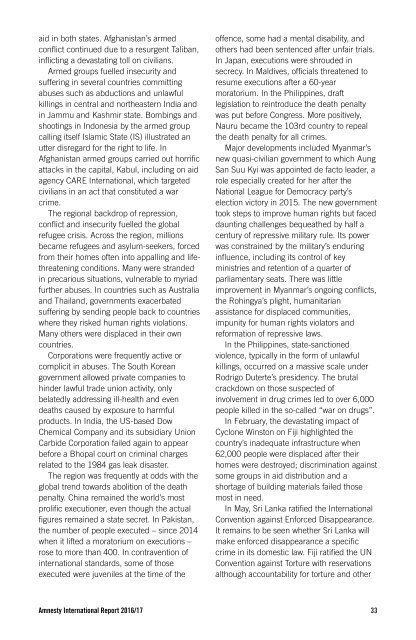AMNESTY INTERNATIONAL REPORT 2016/17
2lEHU9j
2lEHU9j
Create successful ePaper yourself
Turn your PDF publications into a flip-book with our unique Google optimized e-Paper software.
aid in both states. Afghanistan’s armed<br />
conflict continued due to a resurgent Taliban,<br />
inflicting a devastating toll on civilians.<br />
Armed groups fuelled insecurity and<br />
suffering in several countries committing<br />
abuses such as abductions and unlawful<br />
killings in central and northeastern India and<br />
in Jammu and Kashmir state. Bombings and<br />
shootings in Indonesia by the armed group<br />
calling itself Islamic State (IS) illustrated an<br />
utter disregard for the right to life. In<br />
Afghanistan armed groups carried out horrific<br />
attacks in the capital, Kabul, including on aid<br />
agency CARE International, which targeted<br />
civilians in an act that constituted a war<br />
crime.<br />
The regional backdrop of repression,<br />
conflict and insecurity fuelled the global<br />
refugee crisis. Across the region, millions<br />
became refugees and asylum-seekers, forced<br />
from their homes often into appalling and lifethreatening<br />
conditions. Many were stranded<br />
in precarious situations, vulnerable to myriad<br />
further abuses. In countries such as Australia<br />
and Thailand, governments exacerbated<br />
suffering by sending people back to countries<br />
where they risked human rights violations.<br />
Many others were displaced in their own<br />
countries.<br />
Corporations were frequently active or<br />
complicit in abuses. The South Korean<br />
government allowed private companies to<br />
hinder lawful trade union activity, only<br />
belatedly addressing ill-health and even<br />
deaths caused by exposure to harmful<br />
products. In India, the US-based Dow<br />
Chemical Company and its subsidiary Union<br />
Carbide Corporation failed again to appear<br />
before a Bhopal court on criminal charges<br />
related to the 1984 gas leak disaster.<br />
The region was frequently at odds with the<br />
global trend towards abolition of the death<br />
penalty. China remained the world’s most<br />
prolific executioner, even though the actual<br />
figures remained a state secret. In Pakistan,<br />
the number of people executed – since 2014<br />
when it lifted a moratorium on executions –<br />
rose to more than 400. In contravention of<br />
international standards, some of those<br />
executed were juveniles at the time of the<br />
offence, some had a mental disability, and<br />
others had been sentenced after unfair trials.<br />
In Japan, executions were shrouded in<br />
secrecy. In Maldives, officials threatened to<br />
resume executions after a 60-year<br />
moratorium. In the Philippines, draft<br />
legislation to reintroduce the death penalty<br />
was put before Congress. More positively,<br />
Nauru became the 103rd country to repeal<br />
the death penalty for all crimes.<br />
Major developments included Myanmar’s<br />
new quasi-civilian government to which Aung<br />
San Suu Kyi was appointed de facto leader, a<br />
role especially created for her after the<br />
National League for Democracy party’s<br />
election victory in 2015. The new government<br />
took steps to improve human rights but faced<br />
daunting challenges bequeathed by half a<br />
century of repressive military rule. Its power<br />
was constrained by the military’s enduring<br />
influence, including its control of key<br />
ministries and retention of a quarter of<br />
parliamentary seats. There was little<br />
improvement in Myanmar’s ongoing conflicts,<br />
the Rohingya’s plight, humanitarian<br />
assistance for displaced communities,<br />
impunity for human rights violators and<br />
reformation of repressive laws.<br />
In the Philippines, state-sanctioned<br />
violence, typically in the form of unlawful<br />
killings, occurred on a massive scale under<br />
Rodrigo Duterte’s presidency. The brutal<br />
crackdown on those suspected of<br />
involvement in drug crimes led to over 6,000<br />
people killed in the so-called “war on drugs”.<br />
In February, the devastating impact of<br />
Cyclone Winston on Fiji highlighted the<br />
country’s inadequate infrastructure when<br />
62,000 people were displaced after their<br />
homes were destroyed; discrimination against<br />
some groups in aid distribution and a<br />
shortage of building materials failed those<br />
most in need.<br />
In May, Sri Lanka ratified the International<br />
Convention against Enforced Disappearance.<br />
It remains to be seen whether Sri Lanka will<br />
make enforced disappearance a specific<br />
crime in its domestic law. Fiji ratified the UN<br />
Convention against Torture with reservations<br />
although accountability for torture and other<br />
Amnesty International Report <strong>2016</strong>/<strong>17</strong> 33


